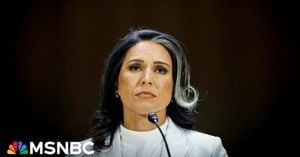On August 31, 2025, a wave of political and policy changes swept across the United States, with former Vice President Kamala Harris finding herself at the center of a high-stakes security shakeup. The same day, President Donald Trump made headlines for a slew of decisions that sent ripples through Washington and beyond, from slashing the U.S. foreign aid budget to overseeing a shakeup at the Centers for Disease Control and Prevention (CDC). The confluence of these events underscored the turbulent and, at times, personal nature of American politics as the country heads into a new chapter.
According to reports from California, Harris will lose her Secret Service detail due to President Trump’s order revoking her federal protection. The move, which officially takes effect at the end of August, ends what had been an unusually long extension of security coverage for a former vice president. Under the Biden administration, Harris had been granted protection until July 2026—a full eighteen months beyond the traditional six-month window given to vice presidents after they leave office. Only Dick Cheney, back in 2009, had previously received such extended protection, making Harris’s case a rare exception to the rule.
Traditionally, U.S. presidents receive lifetime Secret Service protection, while vice presidents are allotted just six months after leaving office. The rationale, according to historical precedent, is that former presidents remain high-profile targets, while vice presidents generally fade somewhat from the public spotlight. However, as political tensions have escalated in recent years, the lines between private citizen and public figure have blurred, especially for trailblazers like Harris.
President Trump’s decision to revoke Harris’s protection has not gone without criticism. Los Angeles Mayor Karen Bass was quick to weigh in, describing the move as “another act of revenge.” Her pointed words echoed a growing sentiment among some officials and observers that security decisions for former leaders should not be subject to “erratic, vindictive political impulses,” as Governor Gavin Newsom’s office put it. Newsom himself, while declining to discuss specifics, made it clear that the safety of public officials is a paramount concern, hinting at the political undertones that have come to define so many aspects of governance in recent years.
With the federal cover set to end, state officials in California have moved swiftly to ensure Harris is not left vulnerable. According to multiple sources, including statements from Newsom’s administration, the California Highway Patrol will now take over her security detail. The arrangement, brokered in part by Governor Newsom and Mayor Bass, aims to fill the gap left by the withdrawal of round-the-clock federal agents and the intelligence support that comes with them. While the specifics of the new security plan remain under wraps—perhaps for obvious reasons—the message from California’s leadership is clear: Harris’s safety will not be left to chance.
“The safety of public officials should never be subject to erratic, vindictive political impulses,” a spokesperson for Newsom reiterated, underscoring the seriousness with which state leaders are approaching the situation. The transition from federal to state protection is significant, not just in terms of logistics but also as a symbol of the increasingly fraught relationship between the federal government and blue-state strongholds like California.
The revocation of Harris’s Secret Service detail comes as part of a broader flurry of activity from the Trump White House. On the same day, President Trump made headlines for a series of bold moves, including cutting nearly $5 billion from the U.S. foreign aid budget. As reported by national broadcasters, the decision has sparked debate over its implications for both America’s role on the world stage and the potential impact on domestic priorities. To provide context, a professor of modern American political history was brought in to discuss what these cuts could mean for everyday Americans, highlighting the ongoing tug-of-war between domestic spending and international commitments.
The week also saw a marathon Cabinet meeting, a crackdown on crime, and a shakeup at the CDC—each move signaling the administration’s determination to chart a new course. While details on the CDC changes remain sparse, the shakeup comes amid ongoing debates about public health policy and the legacy of the COVID-19 pandemic. Meanwhile, the crime crackdown has been framed by the administration as a response to rising concerns about safety and order in major cities, though critics argue that such measures often come with political motivations.
Amid these high-profile changes, the broadcast also touched on advances in mental health treatment, specifically eye-movement desensitization and reprocessing (EMDR) for post-traumatic stress disorder (PTSD). Brendon Fallon, reporting for Vital Signs, shared insights from a leading clinical psychologist on how moving one’s eyes back and forth—a core part of EMDR—can help individuals process traumatic memories. While far removed from the day-to-day drama of Washington politics, the segment served as a reminder that innovation and personal resilience remain vital themes in American life.
Speaking of resilience, Scott Curly’s story provided a powerful counterpoint to the week’s political tumult. Once homeless and incarcerated, Curly has since become the head of a multimillion-dollar tax firm, inspiring others to overcome their own obstacles. His journey, covered in the same broadcast, resonated with viewers looking for hope and redemption amid the relentless churn of headlines. Curly’s experience underscored that, even in times of upheaval, personal transformation and second chances are possible—a message that feels especially timely as the nation grapples with uncertainty and division.
Returning to the issue of Harris’s security, the transition from federal to state protection raises important questions about the politicization of safety in America. While supporters of Trump argue that the move simply restores the traditional rules for vice presidential protection, critics see it as a targeted act meant to send a message. The sharp words from Mayor Bass—calling the revocation “another act of revenge”—speak to the deep mistrust that now colors so much of the national conversation.
Yet, for all the political maneuvering, the practical realities remain: Harris will no longer have access to the full resources of the Secret Service, including national intelligence and rapid response teams. Instead, her safety will rest with California’s own law enforcement apparatus—a capable force, to be sure, but one with different tools and limitations. The precedent set by Dick Cheney’s extended protection in 2009 looms large, raising questions about consistency and fairness in how such decisions are made.
As August draws to a close, the events of the past week serve as a microcosm of the broader challenges facing the United States. From the personal security of high-profile figures to sweeping policy changes and stories of individual triumph, the country finds itself at a crossroads—torn between tradition and change, unity and division. In the end, the true test may lie not in the headlines themselves, but in how Americans choose to respond to them: with vigilance, with compassion, and with a commitment to the values that have long defined the nation’s character.




